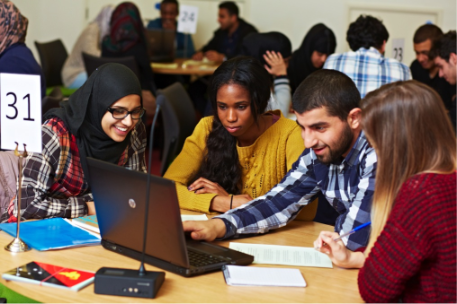Back to school for new teaching technique

A teaching method used successfully to improve learning in higher education is to be introduced into UK secondary schools for the first time, as part of a new European research project.
The University of Bradford – who leads the project – was the first in the UK to use the methodology, known as Team-Based Learning (TBL), for their Pharmacy undergraduate programmes. The University will work with partners in Spain, the Netherlands and Ireland to train and support teachers to apply TBL in their classrooms.
In each country, four schools will take part. In the UK, the project will see the University of Bradford team up with New College Bradford, a sixth form college based in the city, and three schools in the North West run by the Northern Schools Trust.
Team-Based Learning works as an alternative to lectures or traditional classes, but rather than doing homework after a class, students do it in advance. They are directed to study materials and then tested in class first individually and then in teams on what they’ve learned. The results allow teachers to identify gaps or misunderstandings, which they can then address. This ensures that all students have the same level of initial knowledge. In the following sessions, the students work in the same teams to apply their new knowledge to solve various real-world issues, problems or challenges.
Lead researcher, Dr Simon Tweddell, who brought the teaching method to Bradford, explains: “We’ve found that students enjoy TBL more than standard lectures and get more out of the classes as well. The tests motivate them to do the preparation work meaning that our time with them in the classroom is spent helping them to learn how to use and apply this knowledge.
“There’s a wealth of rich discussion that takes place in and between teams as we facilitate their learning. We’re convinced students take away much more than when using traditional methods, retain the information for longer, and of course develop their team-working skills.”
The project team will train two teachers from each school in TBL over the next two years and support them in developing TBL teaching materials and delivering the classes. Some teachers will also be trained to train others, with the aim of expanding the use of the technique more widely.
The training will be carried out at the Athlone Institute of Technology in Ireland and at The International Baccalaureate Organisation in the Netherlands. The Fundación Educación Católica in Spain, who are already using TBL in some schools, will provide ongoing support and mentorship to develop teaching resources.
The University of Bradford will lead on the evaluation of the pilot project, assessing how well the technique works in different environments and with different disciplines. TBL was developed in the USA for use in university business education, but has since been widely used in medical education and also social sciences.
“Introducing TBL has really helped improve outcomes on our pharmacy programmes and we hope to see the same impact in these schools,” says Dr Tweddell. “By bringing all the teachers together for the training, we also hope to build a community of TBL secondary school teachers across Europe, who can support each other as they put this training into practice.”
The €400K project is funded under the European Commission’s Erasmus+ programme.
